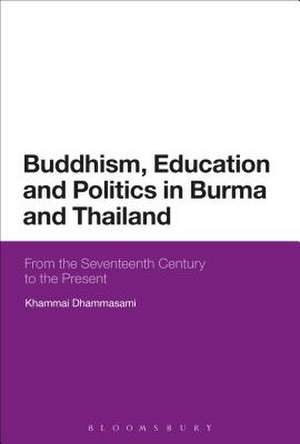Buddhism, Education and Politics in Burma and Thailand: From the Seventeenth Century to the Present
Autor Venerable Dr Khammai Dhammasamien Limba Engleză Paperback – 24 iul 2019
| Toate formatele și edițiile | Preț | Express |
|---|---|---|
| Paperback (1) | 232.07 lei 6-8 săpt. | |
| Bloomsbury Publishing – 24 iul 2019 | 232.07 lei 6-8 săpt. | |
| Hardback (1) | 717.05 lei 6-8 săpt. | |
| Bloomsbury Publishing – 10 ian 2018 | 717.05 lei 6-8 săpt. |
Preț: 232.07 lei
Preț vechi: 297.75 lei
-22% Nou
Puncte Express: 348
Preț estimativ în valută:
44.41€ • 46.50$ • 36.83£
44.41€ • 46.50$ • 36.83£
Carte tipărită la comandă
Livrare economică 10-24 aprilie
Preluare comenzi: 021 569.72.76
Specificații
ISBN-13: 9781350123069
ISBN-10: 1350123064
Pagini: 288
Dimensiuni: 156 x 234 x 15 mm
Greutate: 0.41 kg
Editura: Bloomsbury Publishing
Colecția Bloomsbury Academic
Locul publicării:London, United Kingdom
ISBN-10: 1350123064
Pagini: 288
Dimensiuni: 156 x 234 x 15 mm
Greutate: 0.41 kg
Editura: Bloomsbury Publishing
Colecția Bloomsbury Academic
Locul publicării:London, United Kingdom
Caracteristici
Provides historical coverage from the 17th century including the influence of British colonists right up to the present day and the current politics of Burma
Notă biografică
Venerable Khammai Dhammasami is Buddhist Chaplain of the University of Oxford, UK. He is also Research Fellow at the Oxford Centre for Buddhist Studies at the University of Oxford, UK, and Executive Secretary of the International Association of Buddhist Universities. He has recently set up the Shan State Buddhist University in Taunggyi, Myanmar.
Cuprins
AcknowledgementsAbbreviations1. Introduction 2. Burma: The Education of the Sangha under Strong Monarchs - Thalun (1629-1648) of the Ava Period and Bodawpaya (1782-1819) of the Kon-Baung Period3. Burma: A Threatened Buddhist Kingdom and a Nationalist Sangha -Mindon (1853-1878) 4. Siam: Political Instability and the Sangha 5. Siam: The Standardisation of Monastic Education, and National 6. Integration, under Chulalongkorn (1868-1910)6. Idealism and Pragmatism: Dilemmas in the Current Monastic 8. Education Systems of Burma and ThailandHistorical SummaryAfterwordSources:Appendix AAppendix BAppendix CAppendix DSelected BibliographyNotesGlossaryIndex
Recenzii
Ven. Dhammasami has contributed an excellent overview of the history of Buddhist monastic education in Burma, bringing the fresh perspective of a practicing monk and teacher to this much needed study.
A thought-provoking and impressively referenced publication on the role of education in the past, present and future of Buddhism. The author lucidly explains the changing role of the Sangha and the often-sobering implications. This seminal work provides an essential perspective for many different disciplines. Most obviously are education and religious studies, but the insights on past royal and monastic relationships offer vital lessons to ensure a sustainable future for Buddhist cultural heritage.
The Buddhist monastic education in Burma and Thailand from the early modern period to the present and its current predicament is analysed here by one of the most knowledgeable and versatile members of the Sangha, deeply involved in both traditions, and has himself followed through the system of education he discusses. With his wide exposure to both traditional Asian and modern Western academic traditions, the author draws from a wide variety of sources, and analyses the two monastic education systems with remarkable objectivity and impartiality. The end result is a future-oriented work forging a middle path between idealism and pragmatism.
In this book, Ven. Dhammasami provides an overview of the history of monastic syllabus in Burma and in Thailand since the 17th century. He highlights changes in the interface between the Sangha and the monarchy/state. Government and lay organizations have increasingly formalized and shaped monastic education over time, including standardizing syllabuses and examinations on a national basis. This leaves little scope for local innovation and meeting of student objectives. Ven. Dhammasami's excellent authoritative work is extremely valuable as an insider's view of Sangha education and will serve as valuable landmark at a time of reform.
A thought-provoking and impressively referenced publication on the role of education in the past, present and future of Buddhism. The author lucidly explains the changing role of the Sangha and the often-sobering implications. This seminal work provides an essential perspective for many different disciplines. Most obviously are education and religious studies, but the insights on past royal and monastic relationships offer vital lessons to ensure a sustainable future for Buddhist cultural heritage.
The Buddhist monastic education in Burma and Thailand from the early modern period to the present and its current predicament is analysed here by one of the most knowledgeable and versatile members of the Sangha, deeply involved in both traditions, and has himself followed through the system of education he discusses. With his wide exposure to both traditional Asian and modern Western academic traditions, the author draws from a wide variety of sources, and analyses the two monastic education systems with remarkable objectivity and impartiality. The end result is a future-oriented work forging a middle path between idealism and pragmatism.
In this book, Ven. Dhammasami provides an overview of the history of monastic syllabus in Burma and in Thailand since the 17th century. He highlights changes in the interface between the Sangha and the monarchy/state. Government and lay organizations have increasingly formalized and shaped monastic education over time, including standardizing syllabuses and examinations on a national basis. This leaves little scope for local innovation and meeting of student objectives. Ven. Dhammasami's excellent authoritative work is extremely valuable as an insider's view of Sangha education and will serve as valuable landmark at a time of reform.
